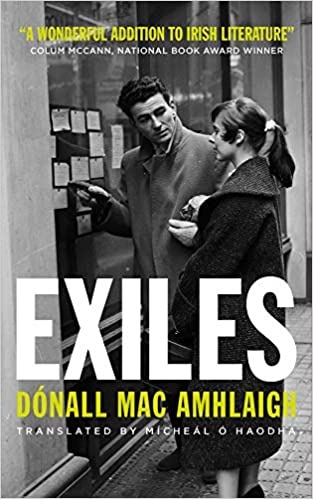This is the last article you can read this month
You can read more article this month
You can read more articles this month
Sorry your limit is up for this month
Reset on:
Please help support the Morning Star by subscribing here
GIVEN the extent of Irish migration to Britain, the length of its history and the volume of workers crossing the Irish Sea, surprisingly little has been written about the phenomenon.
Few Irish novels chronicle the displacements to the great metropolises of Britain and this is the more

striking an omission from a small nation teeming with world-class writers.
The novel Exiles gives some insight on this reticence. Written by Donall Mac Amhlaigh, one of the most important Irish-language writers of the 20th century, the stories of migrants to a post-war, booming Britain, are told against a background of loss for the impoverished Free State — half a million workers had to leave their homes during the period.
In this sense, the novel is an enlightening examination of the contradictory emotions, loyalties and impossible decisions underlying the wider migrant phenomenon to this day.
Translated by Micheal O Haodha, Exiles follows the journeying of two youngsters seeking a credible life amongst the legions of nurses and navvies — “McAlpine’s Fusiliers” — many with few words of English. Here they are portrayed as hard men of the west, taking pride in their ability to withstand backbreaking work.
The novel brings to life Irish communities of 1950s London, now largely gone — the packed pubs of Kilburn and Camden Town, dancehalls like The Blarney on Tottenham Court Road and the early-morning pick-ups on Parkway, where an army of hobnailed boots would be heard skidding and scraping onto the open lorries.
Exiles is a cracking read and a valuable documenting of the remaking of modern Britain after the war. It details the developing Anglo-Hibernian relationship at the level of lived experience by those integral to the success of both countries, the workers.
A life-long socialist, Mac Amhlaigh depicts at first hand the energy of a workforce eager to thrive. He shows too the sadness of cultural loss — the 1950s migration deals a last death blow to the native language of Connemara and West Kerry.
The alienation of the migrant is also revealed in this deeply realised portrayal of working-class life. No longer at home in their original community, nor in the new society they are helping to build, the exiles remain on the outskirts of both cultures.
Mac Amhlaigh’s novel is part of Welsh publisher Parthian’s estimable Carnival of Voices series, which brings works in smaller European languages to English readers.
Published by Parthian, £11.99.
FIONA O’CONNOR






